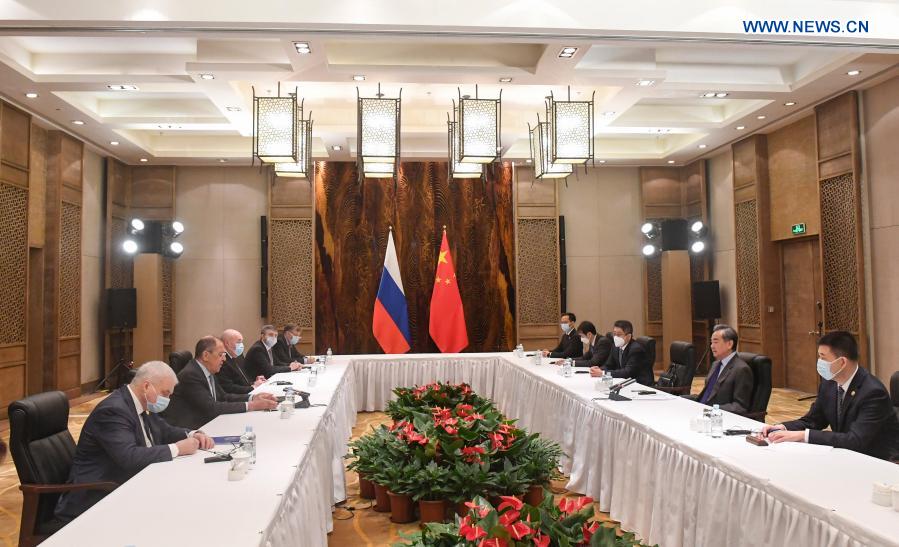Chinese, Russian FMs hold talks, reach strategic consensus

Chinese State Councilor and Foreign Minister Wang Yi meets with Russian Foreign Minister Sergei Lavrov in the city of Guilin, south China's Guangxi Zhuang Autonomous Region, March 23, 2021. (Xinhua/Lu Boan)
Chinese State Councilor and Foreign Minister Wang Yi held talks on Tuesday with Russian Foreign Minister Sergei Lavrov, with the two sides reaching strategic consensus.
The talks, held in the city of Guilin, in south China's Guangxi Zhuang Autonomous Region, were the 51st meeting between Wang and Lavrov. "This shows the high level of China-Russia comprehensive strategic partnership of coordination," Wang said.
Strategic communication, coordination
No matter how the international situation changes, the comprehensive strategic coordination between the two countries will only strengthen and expand, rather than weakening or shrinking, the Chinese foreign minister said.
The two sides agreed that strategic guidance by the two heads of state constitutes the political strength of bilateral ties, while jointly fighting the pandemic has further deepened the traditional friendship between the people of both countries.
They also agreed that pragmatic cooperation has strongly boosted the two countries' economic and social development, and their international coordination has contributed stability and positive energy to the world.
In the face of rapid changes in the international situation, carrying out timely strategic communication and coordination is not only important to China and Russia, but also beneficial to the world, Wang said.
This year marks the 20th anniversary of the signing of the China-Russia Treaty of Good-neighborliness and Friendly Cooperation. Noting that the two sides have agreed to renew the treaty and make it more relevant in the new era, Wang said this demonstrates the new heights, new ideas and new results of China-Russia cooperation.
The two sides should strengthen strategic coordination, firmly fight back against false information regarding China and Russia, beef up cooperation on information security, support each other in maintaining the security of their own governments and systems, and safeguard their legitimate rights and common interests, as well as maintaining stability in the areas around the two countries, Wang said.
China is willing to discuss establishing a mutual recognition mechanism for health codes with Russia, on the basis of friendly consultation and fully accommodating each other's concerns, Wang said, calling on the two sides to further deepen vaccine cooperation and help improve the accessibility of vaccines in developing countries.
He also urged the two sides to take their Year of Scientific and Technological Innovation as an opportunity to tap the potential for cooperation on 5G, big data, the green economy, the internet, climate change, environmental protection and the health industry, working towards the goal of 200 billion U.S. dollars in trade volume.
Lavrov said the friendship between the two countries is very solid with higher quality.
"Russia is willing to work with China to implement the consensus reached by the two heads of state, maintain close high-level exchanges, make preparations for the extension of the Russia-China Treaty of Good-neighborliness and Friendly Cooperation, and take the bilateral relationship to a higher level," Lavrov said.
Global governance
After the talks, the two foreign ministers signed several bilateral-cooperation deals as well as a joint statement on global governance, calling on the international community to put aside their differences, build consensus, strengthen coordination and safeguard world peace and geo-strategic stability.
On the topic of human rights, the two sides said all countries should oppose politicizing human rights issues, reject using human rights as an excuse to interfere in other countries' internal affairs, abandon double standards, and engage in dialogue on the basis of equality and mutual respect, according to the statement.
There is no unified standard for the model of democracy, the statement said. The legitimate right of sovereign countries to choose their own development paths should be respected, and interfering in sovereign countries' internal affairs under the pretext of "advancing democracy" is not acceptable, the statement said.
In face of heightened international political turbulence, there is an urgent need to hold a summit of permanent members of the U.N. Security Council, to facilitate direct dialogue and discussion of solutions to problems facing all human beings and help maintain stability of the world, the statement said.
China is willing to further strengthen cooperation with Russia under the multilateral framework, jointly safeguard multilateralism, maintain the international system with the UN at the core and the international order based on international law, while firmly opposing unilateral sanctions as well as interference in other countries' internal affairs, Wang said.